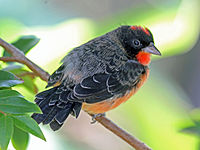Crimson-breasted finch
| Crimson-breasted finch | |
|---|---|

| |
| Scientific classification | |
| Domain: | Eukaryota |
| Kingdom: | Animalia |
| Phylum: | Chordata |
| Class: | Aves |
| Order: | Passeriformes |
| Family: | Thraupidae |
| Genus: | Rhodospingus Sharpe, 1888 |
| Species: | R. cruentus
|
| Binomial name | |
| Rhodospingus cruentus (Lesson, 1844)
| |

| |
The crimson-breasted finch (Rhodospingus cruentus), also known as the crimson finch-tanager, is a species of small finch-like bird native to woodland and scrub of western Ecuador and adjacent north-western Peru. It is the only member of the genus Rhodospingus. It has traditionally been placed in the family Emberizidae, but molecular phylogenetic studies have shown that it belongs to the tanager family Thraupidae. It is strongly sexually dichromatic, with males being blackish above and rich orange-red below and on the crown, while females are overall dull greyish-buff.
Taxonomy
[edit]The crimson-breasted finch was formally described in 1844 by the French naturalist René Lesson under the binomial name Tiaris cruentus . The type locality is Guayaquil in Ecuador.[2][3] The crimson-breasted finch is now the only species placed in the genus Rhodospingus that was erected by the English ornithologist Richard Bowdler Sharpe in 1888.[4][5] The genus name combines the Ancient Greek rhodon meaning "rose" and spingos meaning "finch". The specific epithet cruentus is the Latin word for "bloody".[6] The crimson-breasted finch is monotypic: no subspecies are recognised.[5]
Gallery
[edit]-
Crimson-breasted finch
-
Crimson-breasted finch
References
[edit]- ^ BirdLife International (2016). "Rhodospingus cruentus". IUCN Red List of Threatened Species. 2016: e.T22723055A94801736. doi:10.2305/IUCN.UK.2016-3.RLTS.T22723055A94801736.en. Retrieved 11 November 2021.
- ^ Lesson, René (1844). "Oiseaux nouveaux". Revue Zoologique (in French). 7: 433–437 [435–436].
- ^ Paynter, Raymond A. Jr, ed. (1970). Check-List of Birds of the World. Vol. 13. Cambridge, Massachusetts: Museum of Comparative Zoology. p. 212.
- ^ Sharpe, R. Bowdler (1888). Catalogue of the Passeriformes or Perching Birds in the Collection of the British Museum. Fringilliformes Part III. Catalogue of the Birds in the British Museum. Vol. 12. London: Trustees of the British Museum. p. 808.
- ^ a b Gill, Frank; Donsker, David; Rasmussen, Pamela, eds. (July 2020). "Tanagers and allies". IOC World Bird List Version 10.2. International Ornithologists' Union. Retrieved 11 November 2020.
- ^ Jobling, James A. (2010). The Helm Dictionary of Scientific Bird Names. London: Christopher Helm. pp. 123, 335. ISBN 978-1-4081-2501-4.



